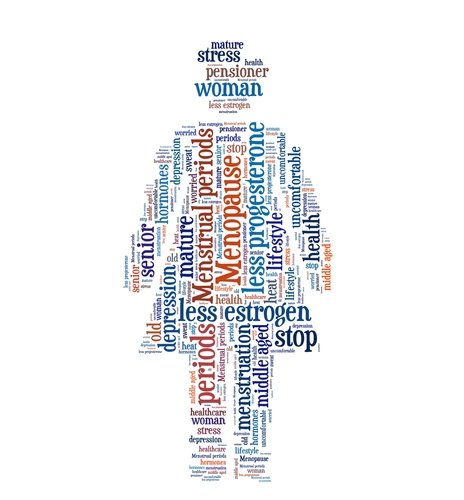The menopause is not a disorder, but a natural process all women will go through. How we move through this cycle of our lives and the symptoms we experience can be a much smoother journey if we establish and maintain healthy diet, lifestyle and stress management habits early on. Prevention is key in Ayurveda.
As we age and the need to reproduce and nurture children is less, our bodies will naturally let go of this process. The need for higher levels of nourishing (sex) hormones becomes less, although the body will continue to produce these hormones post menopause.
If throughout your life, your diet and lifestyle favours the release and maintenance of elevated stress hormones, (as outlined in part 1 of the Woman’s Health Series) and high Pitta, this will have more of an impact on your levels and reserves of the calming and nourishing sex hormones as we reach peri-menopause and menopause.
The menopause marks the transition from the Pitta to the Vata phase of your lifecycle, so you are more likely to experience symptoms of Vata and Pitta imbalance. Common symptoms of peri-menopause and menopause such as hot flashes, night sweats, vaginal dryness can all be attributed to too much heat/pitta/stress in the body. Alleviating these symptoms with a cooling, calming and lubricating diet and lifestyle is the key to managing the symptoms of menopause without the need of hormone replacement therapy (HRT).
Many women experience the effects of excessive heat in the body in the evening and throughout the night. To counteract this, try to consume your largest meal at lunchtime and have a small evening meal – larger meals places more demands on the digestive fire creating more heat. Consider what you eat for your evening meal, try to choose cooling foods (see examples below).
The key message here is not to wait until the peri menopause and menopause phase of your life and deal with the symptoms when they arise. Extreme and prolonged symptoms can be prevented by acting to maintain a balanced diet and lifestyle now.
What we can do through this cycle of our life:
Be aware how of a diet and lifestyle which supports your constitution. By eating with awareness we will get to know foods that are good for us or foods which may be more difficultly to digest. Look for signs of indigestion: gas, bloating and constipation/diarrhoea, lethargy and heaviness after eating, weight gain, excessive heating in the body, acid indigestion and reflux, itchiness or redness in the skin after eating.
Some symptoms of the the menopause: excess heat, dryness and weight gain can be balanced by the foods we eat.
Ayurveda is based on the principles that like increases like, so balance the symptoms with opposing foods. If you experience heating/inflammation/acidity after eating, swop heating/acidic foods: red meat, caffeine, alcohol, citrus fruits, sour fruits: pineapple, sour cherries, tomoatoes, fermented foods: hard cheese, fermented vegetables, pungent spices – chilli, cayenne, salty foods for more cooling, nourishing foods: green vegetables, whole grains, sweet fruits: sweet berries, good quality unrefined oils and ghee, white meat and fish. A diet of whole unprocessed foods is really he key.
A simple Ayurvedic remedy for eliminating excess heat from the body is coriander water. Coriander seeds have very cooling qualities. Lightly crush 3 tsp of coriander seeds and leave to infuse in a glass of water overnight. Strain and drink in the morning. If you are experiencing a lot of heat in the body, make double the quantity and keep it in the fridge to have 2 x per day. Other cooling spices are fennel and anise. Seeds can be dry roasted in a pan until they just give off a little smoke and added to boiling water for a cooling tea.
Counteract heaviness and lethargy with light foods: ditch the sugar, salt, processed foods, heavy carbohydrates, refined foods for lots vegetables, pulses and whole grains. Adding spices to foods will improve their digestively. Cumin, coriander, fennel, caraway, fenugreek are a great place to start. Add the spices the oil before cooking, allow them to pop and add your other ingredients. Adding asafoetida (hing) to pulses during cooking may improve their digestibility for some people.
Dryness can be an issue for some types, Include nourishing, lubricating foods: good quality oils, a little fish, meat, dairy if it suits your constitutional and dietary preference. Nuts and seeds, although oily can be drying and heating, so should be consumed in moderation for Vata and Pitta. The heating quality is suitable for Kapha, but the oiliness can create imbalance. Again, moderation is key.
Stress management: Relaxation and Meditation. I hear a lot of people say that they just don’t have time to relax or have a regular meditation practice – generally Vata and Pitta individuals. The length of time isn’t important. It’s about stepping back, even for 5 minutes, from the routine, pressures and demands of the day. Even spending 5 mins at a the start and the end of the day, just noticing how you are feeling. You may start to notice patterns in your behaviour. Is stress, anxiety, the feelings of being bogged down with the pressures of daily life a regular occurrence. By noticing these feelings you can start to work out how to overcome this. If you are unable to work things out for yourself, speak to someone else about it. Try not to hold on to these feelings.
Try to take 5 minutes, just focusing on your breath. Slowing down the breath and thoughts of the day. This doesn’t need to be done in seated cross leg position. Switch off the TV or computer for 5 mins and start to practice.
Self massage/regular massage
Self Massage (Abhyanga) is an important aspect of your daily routine. Massage helps relieve the body of tension and stress, improves blood flow, removes toxins and is very relaxing. Massaging the body with oil can also counteract dryness, a symptom many women experience during the menopause. Again, consider how you can incorporate this into your daily routine. Oil the body with a suitable oil after your morning shower: Vata and Kapha would do well to use sesame oil, Pitta may want to use coconut oil which is more cooling, especially if you are experiencing excessive heat in the body. Massaging the feet and head with coconut oil before bed is not only very relaxing, but will help remove excess heat from he body.
Having a regular Ayurvedic massage is also a wonderful way to rid the body of stress and tension.
Be aware of the Change of season. As the seasons change, so to does our needs for nourishment. As we go through cycles in our lives, the seasons also follow cycles. Again, living with an open awareness will help you flow in harmony with the seasons maintaining a sense of physical and mental balance.

